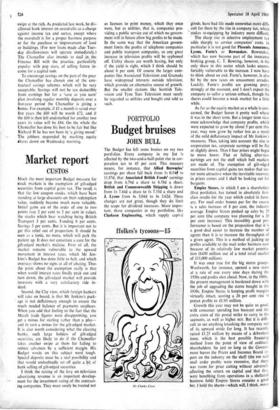Market report
CUSTOS
Much the most important Budget measure for stock markets is the exemption of gilt-edged securities from capital gains tax. The result is that the low coupon stocks, which have -been standing at large discounts on their redemption value, suddenly become much more valuable. Initial gains are of the order of one to two points (say 2 per cent to 3 per cent in value), the stocks which bear watching being British Transport 3 per cents, Funding 6 per cents, Savings 3 per cents. But it is important not to get this relief out of proportion. It should be seen as a tonic, no more, which will perk the patient up. It does not constitute a cure for the silt-edged market's malaise. First of all, the market remains vulnerable to the upward movement in interest rates, which Mr Jen- kins's Budget has done little to halt, and which overseas shows no signs at all of abating. Thus the point about the exemption really is that when world interest rates finally peak out and turn down, the gilt-edged market will provide investors with a very satisfactory ride in- deed.
Second, the City view, which foreign bankers will take on board, is that Mr Jenkins's pack- age is not deflationary enough to ensure the much needed balance of payments surpluses. When you add that feeling to the fact that the March trade figures were disappointing, you get a minus for sterling rather than a plus— and in turn a minus for the gilt-edged market. It is also worth considering what the clearing banks, such large holders of gilt-edged securities, are likely to do if the Chancellor takes another swipe at them for failing to reduce advances by a sufficient margin. His Budget words on this subject were tough. Special deposits must be a real possibility and that would undoubtedly set off quite a pis of bank selling of gilt-edged securities.
I think the raising of the levy on television advertising revenue is an important develop-
- ment for the investment rating of the contract- ing companies. They must surely be treated not as licences to print money, which they once were, but as utilities, that is, companies pro- viding a public service out of which no govern- ment will in future allow big profits to be made. In the same way that the American govern- ment limits the profits of telephone companies and public transport companies, so any great increase in television profits will be syphoned off. Utility shares are worth, having, but only if the yield is right, which I think should be about 6 per cent. Of course the larger com- panies like Associated Television and Granada have widespread interests outside television, which provide an alternative source of growth. But the smaller stations like Scottish Tele- vision and Tyne Tees Television must surely be regarded as utilities and bought and sold as such.










































 Previous page
Previous page